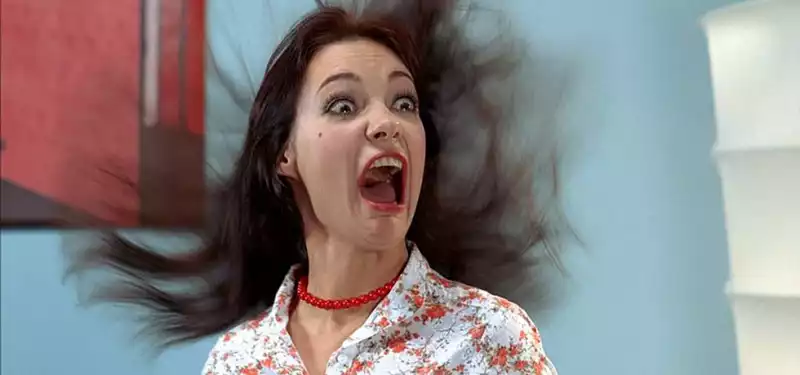Sep 19, 2016
Ottawa Animation Festival 40th Anniversary Reflections: The Inherent Obligation
The Ottawa International Animation Festival, North America's largest and most important animation event, is celebrating its 40th anniversary this year.
To mark the occasion, the festival commissioned international animation historians, programmers, and critics to write essays about the Grand Prize-winning films. In partnership with the festival, Cartoon Brew will present a number of essays during the week leading up to this week's festival, September 21-25, 2016. We have already featured essays on "The Man Who Planted the Tree," "Hen, His Wife," "Two Sisters," and "Carrot Night." Today, we present the 2009 award-winning film Inherent Obligations, directed by Rao Heidmetz.
For information on how to participate in this week's Ottawa, visit animationfestival.ca.
He is ordinary. Chubby, with unkempt hair that obviously won't be long anymore, he looks about 40, maybe a little younger. He sits in front of the television as the newscaster provides commentary, followed by violent images. Slowly, he succumbs to the allure of the spectacle. The obscenely projected reality gradually numbs his senses. The rest of the world disappears.
She is an attractive woman, maybe 30 years old. Neglected by men, she tries to seduce him, then plans to leave, always vacillating between the two. To protect her relationship, to protect herself, she plots elaborate seduction. She provocatively rocks her body and desperately tries to get his attention. She even changes her hairstyle, her dress, and her entire appearance in hopes of rivaling the dream girl who pops off the screen and monopolizes her husband's attention.
This is the story of a man who, like countless others, has been corrupted by voyeurism. A man swallowed by the object of his gaze and rendered helpless by the shackles of illusion. This is the story of a woman who, like countless others, is abandoned, neurotic, and searching for a way to exist. It is the story of countless couples. It is the story of a distorted, absurd, mad world, media-centric, enslaved to obscene representations of raw reality, whose manufactured analysis filters every thought. After all, this world is not so different from our own.
This is the story of the short film "Inherent Obligations" (2008) by Estonian filmmaker Rao Heidmetz. The prolific auteur's 14th short film was honored in Siena (Italy), Fredrikstad (Norway), and Poznan (Poland), and won the Grand Prix in Ottawa.
Born in Pärnu in 1956, Heidmetz studied electrical engineering before entering the world of animation. He first worked for other filmmakers before turning to directing his own films in 1983, winning international acclaim with Theatre Papa Carlo (1988, in competition at the Cannes Film Festival and Grand Prix at the Espinho International Film Festival) and Noblesse Oblige (1989). He gained international acclaim for his work on "Noblesse Oblige" (1989).
While some of his films are aimed at younger audiences ("Auntie Dove" (1983) and "The Gnome Tree" (1991)), the majority of Rao Heidmetz's films about power and freedom are for adults. His characters are often puppets (in every sense of the word), trapped in a collapsing system, as exemplified by the cage in [The Giraffe] (1986), the stage in Papa Carlo's Theater, and the masked ball in Noblesse Obrige. Heidmetz's perspective reveals how the collapse of the Soviet Union changed nothing. The world is nothing but an oppressive machine. Freedom and chaos are often synonymous.
The Living Room (1994) portrays a young girl trapped in an ambiguous relationship with an old man. Her mother's secret visits did not satisfy her, so she physically erased her world and replaced it with a new one, naively portrayed, more in keeping with her expectations.Like Inherent Obligations, The Living Room uses primarily flesh-and-blood actors in Pixillation. Along with "The Giraffe," these are the only Heidmetz works with a positive ending, in which the female protagonist escapes a distorted and alienating reality and finds a kind of freedom.
The thematic unity of Heidmetz's films is particularly noteworthy because it contrasts with their aesthetic and technical diversity. Although his chosen technique of stop-motion remains constant, Heidmetz seems to take pleasure in changing his style from film to film. In particular, his use of different materials (wood and straw in "Noblesse Oblige" and textile fibers in "Oracle is Born" (2011)) and aesthetic approaches (it is surprising that the primitive expressionism of 2006's "Pearlman" came after the naive realism of "Instinct")
Other distinctive elements of Heidmetz's work include the non-linearity of editing, the use of repetition as a narrative tool, the frantic rhythm of certain sequences, and the aggressive use of sound. These four elements form the core of Inherent Obligations, and the ever-present strong music, repetitive transitions, and fast-paced editing have the feel of a music video.
All of Rao Heidmetz's works end up with an unrestrained look, as if they were cast out urgently and abruptly at the moment they were made, with no concern for finishing or fine-tuning. Imperfect, chaotic, and unpolished, the film exudes a unique raw energy, even in its rough edges. Like the sound of chalk tapping on a blackboard, it provokes us, irritates us, and sometimes makes us grit our teeth.
As a social critique that speaks directly to the viewer, Inherent Obligations attacks our complacency and points the finger at our voyeurism, ineptitude, lack of political analysis, and inability to control our miserable existence. As passive spectators of violent imagery, modern man is doomed. A bit masochistic, a bit sadistic, connected to the TV (or computer, or cell phone, all the same) like an overnourished baby sucking on a bottle. The wife can still hold out hope only on the condition that she realizes there is nothing more she can do to save the man. Only she can free herself, throw off the shackles of the marriage bed, and walk the streets with her head held high. Unless, of course, this apparent freedom is an illusion itself.
(translated from the French by Alexandra Grimanis)
.



Post your comment